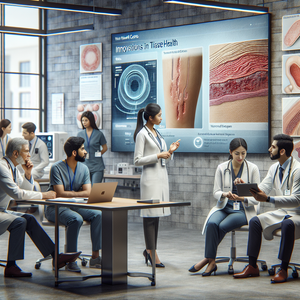The Unsung Heroes of Health Science: Behind-the-Scenes Careers

Medical illustrators play an essential role in bridging the gap between complex medical concepts and patient understanding. They create detailed visual representations of human anatomy, surgical procedures, and medical conditions, which are used for educational materials, medical textbooks, and patient resources. For example, during medical training, illustrations help students visualize intricate structures and processes, enhancing their comprehension and retention of vital information. Moreover, these visuals are pivotal in patient education, allowing individuals to grasp their conditions and treatment options more effectively. The blend of art and science in medical illustration is crucial for effective communication in healthcare. Supporting Example: A study published in the Journal of Medical Education found that students who used visual aids, including medical illustrations, scored 30% higher on anatomy assessments compared to those who relied solely on textbooks. This demonstrates the significant impact that medical illustrators have on education and understanding in health science.
Clinical Data Managers: The Guardians of Integrity
In an era driven by data, clinical data managers are vital in the healthcare landscape. They oversee the collection, validation, and management of data from clinical trials and research studies. Their meticulous work ensures that data is accurate and reliable, crucial for regulatory submissions and the approval of new treatments. For instance, when a pharmaceutical company conducts a trial for a new drug, clinical data managers are responsible for ensuring that the data collected from participants is correctly recorded and analyzed. Their efforts not only uphold the integrity of the research but also contribute to the advancement of medical science, making safe and effective treatments available to patients. Supporting Example: According to a report by the Clinical Trials Transformation Initiative, accurate data management can reduce the time to market for new drugs by as much as 20%. This highlights the critical role that clinical data managers play in expediting the development of medical treatments.
Health Informatics Specialists: The Tech Savvy Innovators
As healthcare continues to evolve with technology, health informatics specialists are becoming increasingly important. They focus on the intersection of information technology and healthcare, managing electronic health records (EHRs), data analytics, and health information systems. Their expertise helps streamline processes, improve patient care, and enhance the overall efficiency of healthcare facilities. For example, during the COVID-19 pandemic, health informatics specialists played a critical role in tracking the virus's spread and managing vaccination data, helping public health officials make informed decisions. Their work ensures that healthcare providers have access to accurate and timely information, ultimately improving patient outcomes. Supporting Example: A study published in Health Affairs found that hospitals with strong health informatics capabilities reported a 15% improvement in patient safety outcomes. This illustrates how crucial health informatics specialists are in enhancing the quality of care provided to patients.
The Impact of Behind-the-Scenes Careers on Patient Care
While the roles of medical illustrators, clinical data managers, and health informatics specialists may not be in the spotlight, their contributions significantly impact patient care and research. By providing clear visual communication, ensuring data integrity, and leveraging technology, these professionals help create a more efficient, informed, and patient-centered healthcare system. Their work often goes unrecognized, but it is foundational in delivering quality healthcare services and fostering innovation.
The healthcare system is a complex ecosystem that relies on a multitude of professionals working behind the scenes to ensure its success. Medical illustrators, clinical data managers, and health informatics specialists are just a few of the unsung heroes who play pivotal roles in enhancing patient care and advancing medical research. As we continue to navigate the evolving landscape of health science, it is essential to recognize and appreciate the contributions of these individuals. By shining a light on their vital work, we can foster a greater understanding of the diverse career paths within health science, inspiring future professionals to explore these rewarding and impactful roles. The next time you think of health science careers, remember the unsung heroes making a profound difference behind the scenes.
Medical Illustrator
Medical schools, publishing companies, hospitals, and pharmaceutical companies
Core Responsibilities
Create detailed visual representations of medical concepts, including anatomy and surgical procedures for educational and patient resources.
Collaborate with healthcare professionals and researchers to ensure accuracy in illustrations.
Required Skills
Proficiency in graphic design software (e.g., Adobe Illustrator, Photoshop).
Strong understanding of human anatomy and medical terminology.
Unique Qualifications
A bachelor's degree in medical illustration or a related field, along with a portfolio demonstrating artistic and anatomical accuracy.
Clinical Data Manager
Pharmaceutical companies, contract research organizations (CROs), and academic research institutions
Core Responsibilities
Oversee the collection, validation, and management of data for clinical trials and research studies.
Ensure compliance with regulatory standards and maintain data integrity throughout the research process.
Required Skills
Knowledge of clinical trial processes and data management systems (e.g., EDC systems).
Strong analytical skills and attention to detail to identify discrepancies in data.
Unique Qualifications
A degree in life sciences or a related field, along with experience in clinical data management.
Health Informatics Specialist
Hospitals, health IT companies, and public health organizations
Core Responsibilities
Manage electronic health records (EHRs) and health information systems to enhance patient care and operational efficiency.
Analyze healthcare data to inform decision-making and improve health outcomes.
Required Skills
Proficiency in data analytics tools and software (e.g., SQL, Tableau).
Understanding of healthcare regulations, including HIPAA and data privacy laws.
Unique Qualifications
A master's degree in health informatics or a related field, along with certification in health informatics (e.g., CAHIMS).
Biostatistician
Pharmaceutical companies, government health agencies, and academic research institutions
Core Responsibilities
Design and analyze data from clinical trials, ensuring statistical methods are applied correctly to assess treatment efficacy and safety.
Collaborate with researchers to interpret statistical results and contribute to study reports and publications.
Required Skills
Expertise in statistical software (e.g., SAS, R) and strong mathematical skills.
Ability to communicate complex statistical concepts to non-statisticians.
Unique Qualifications
A master’s or Ph.D. in biostatistics, statistics, or a related field with experience in clinical research.
Health Policy Analyst
Government agencies, non-profit organizations, and think tanks
Core Responsibilities
Research and analyze health policies, evaluating their impact on healthcare systems, patients, and providers.
Develop policy recommendations based on data analysis and stakeholder needs.
Required Skills
Strong analytical and research skills, with the ability to synthesize complex information into actionable insights.
Excellent written and verbal communication skills for presenting findings to diverse audiences.
Unique Qualifications
A master's degree in public health, health policy, or a related field, along with experience in policy analysis or advocacy.


